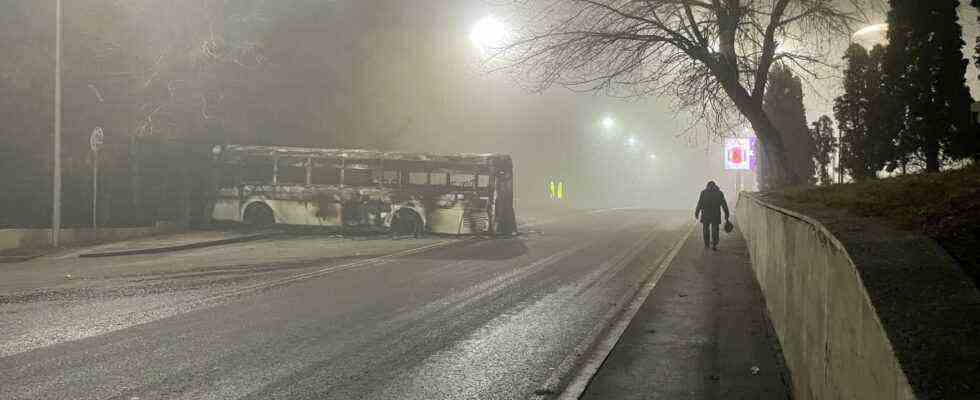The army should open fire, the President of Kazakhstan has asked them to. “Without warning,” said Kassym-Shomart Tokayev in the last of his many televised speeches, security forces and soldiers are now likely to shoot people who were causing unrest in Almaty. “Terrorists”, he calls these people, unfortunately it is not very clear who he means by that.
For almost a week, thousands of Kazakhs have been protesting against the political regime in several cities and regions of the country. In Almaty in particular, there were fierce street battles between the police and protesters, several buildings there were devastated or set on fire, and shots were fired day and night. The Kazakh state television reported on Friday morning that 26 protesters were killed, and the authorities said 18 police officers were killed. At least one Kazakh journalist was among the dead.
Tokayev declared the protesters to be foreign-trained terrorists on Wednesday. He reinterpreted the demonstrations as an attack from outside. They were triggered by anger over doubled fuel prices; they grew due to the frustration of many Kazakhs over an apparently unchangeable authoritarian regime. In Almaty in particular, however, the protests quickly led to violence.
Tokayev now claims that the metropolis was attacked by 20,000 “bandits”. These would have to be “destroyed” quickly. He described calls from abroad to resolve the matter peacefully as stupid: “What kind of negotiations can there be with criminals and murderers?” Germany’s Justice Minister Marco Buschmann (FDP) was among those who sharply condemned Tokayev’s order to shoot. “Anyone who allows demonstrators to be shot without warning in order to kill has left the circle of civilized states,” he wrote on Twitter.
Were there provocateurs and who could have sent them?
The situation in Kazakhstan remains confusing, also because many websites are still inaccessible. However, observers have long been asking completely different questions than Tokayev. The most important is whether violent groups were deliberately mixed with the protesters – and if so, by whom. At least it is noticeable that the regime allowed them to loot for a long time, looting shops, banks and the airport. Sending provocateurs to protest to escalate the situation and make peaceful demonstrators look like a threat would not be a new tactic. Who would it be of use in Kazakhstan?
In any case, Kassym-Schomart Tokayev is not reinterpreting the protest as an attack supported by abroad for no reason. With this argument, he called his partners in a military alliance for help: The Organization of the Treaty on Collective Security (OKVS), which in its almost 20 years of existence has never responded to a call for help from one of its member states, immediately sent troops. They come from Belarus, Armenia, Kyrgyzstan, Tajikistan and Russia, which heads the OKVS. So far, the allies had mainly practiced together and traded weapons among themselves. Now, of all things, they are intervening in a conflict that is actually a domestic one.
This premiere seemed even stranger because of all people, Armenia’s Prime Minister Nikol Pashinyan promised the Kazakhs Tokayev the “collective peacekeeping forces” that are now supposed to bring the protest under control. Armenia is currently leading the security alliance on a rotating basis. Nikol Pashinyan came to power after protests in Armenia. Not so long ago he himself had hoped for alliance aid against Azerbaijani troops in the conflict over the Nagorno-Karabakh region – and received none.
Moscow in particular sent soldiers to Almaty all the faster. They are said to have already taken control of the airport and patrol the streets of the metropolis. One can only guess why Putin reacted this time. He probably didn’t want to afford another trouble spot in the neighborhood, or risk another example of a fallen autocrat. In addition, Kazakhstan is particularly interesting for Moscow because of its rich resources, its size and its location between Russia and China.
Putin’s support is important to Tokayev
Tokayev’s behavior is more difficult to explain. By inviting Russian soldiers, he is risking an independence that Kazakhstan has maintained for thirty years. For Moscow, the effort remains manageable: For Tokayev, more important than the troops themselves is that Putin publicly supports him. In doing so, he is sending a signal to all Kazakh soldiers, officials and secret service agents who may be wavering in their loyalty.
Because while the protests continue, something very decisive is happening in Tokayev’s power apparatus these days: step by step he dethrones a man who was once much more powerful than Tokayev today, his predecessor Nursultan Nazarbayev. In the meantime, it is said, Tokayev’s authorities are even using the old name Astana again for the Kazakh capital. Three years ago, Tokayev had renamed her Nursultan in honor of Nazarbayev.

